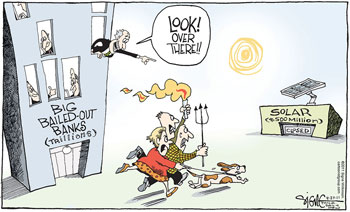sierraclub.org - sierra magazine - jan/feb 2012 - taking the initiative
By Carl Pope
TIME TO BUILD STUFF AGAIN
The real Solyndra scandal is that we're ceding solar to China
 Signe Wilkinson/Washington Post Writers Group/Cartoonist Group
Signe Wilkinson/Washington Post Writers Group/Cartoonist GroupThe bankruptcy of solar-energy firm Solyndra is the model of a faux scandal. The outcry is driven not by any illegality--none has been alleged--but by partisan attacks on President Barack Obama's administration. The president's opponents are politicizing the Solyndra bankruptcy in an attempt to tar his clean-energy efforts--even those that have created jobs in their own districts.
Solyndra failed because other solar companies outraced it, not because the solar industry or green energy is in trouble. New companies fail in any technological revolution; the U.S. computer industry, for example, is littered with the remains of hundreds of bankrupt companies.
What should be setting off alarms is that the companies outracing Solyndra were not American but Chinese--and they had 20 times as much support from their government. (Some U.S. solar manufacturers argue that this constitutes an illegal trade subsidy.) The lesson of Solyndra is not that we did too much to aid clean energy, but that we did too little.
In the early days of the Obama administration, a leading solar manufacturer proposed a major scale-up of its U.S. capacity: If the administration would dedicate a series of federally owned toxic-waste sites as solar farms and commit to buying the power from those farms, the company would finance and build new solar-manufacturing facilities. Sadly, the Department of Energy wasn't organized for such fast action. The result: The company shifted much of its manufacturing and engineering capacity to China.
Solar isn't the only clean-energy technology moving to China. China pays $0.075 for every kilowatt-hour a wind turbine feeds into the grid--and backs up its commitment to wind power with tax incentives, financing, and infrastructure. The result: Nearly half of the world's total wind installations in 2010 were built in China.
Why does it matter where the next generation of clean-energy technologies is made? Manufacturing provides highly skilled, well-paying jobs. It supports innovation. It creates demand for supply chains made up of smaller businesses, enabling a more diverse group of workers to contribute to and share in prosperity.
Many Americans believe that we lost our lead in manufacturing because of our high wages. That's not true. Germany and Japan are high-wage countries that retain their manufacturing preeminence because they work at it. Rather, the United States gave away its manufacturing base. We listened to those who told us we didn't really need to make things anymore--we could just import stuff. That didn't work out very well.
What we need to reverse course is simple. A federal manufacturing and innovation policy requires four ingredients: consistent support (not a onetime stimulus); long-term incentives (not tax credits that expire every two years); market access for solar and wind power, low-carbon vehicles, zero-waste appliances, and high-performance buildings; and affordable financing for modernizing the grid, rebuilding transit, and retrofitting buildings.
Clean-energy manufacturing, not just research, is the key to eliminating greenhouse pollution and reviving our economy. A national manufacturing and innovation policy will create the jobs and income that will pay off the deficit, cut carbon dioxide pollution, and restore American leadership.
The business community agrees: The U.S. Chamber of Commerce opposed Tea Party efforts to cut investments in advanced-technology vehicle manufacturing. And state governors like Haley Barbour in Mississippi proudly shovel billions of dollars of federal tax credits and subsidies into new factories and manufacturing jobs.
Why is it OK for Mississippi to have a manufacturing policy but not America? Because in Washington, a small but very committed group of ideologues seek to derail Obama's reelection. They are happy to see American manufacturing come to a halt--at least until they retake the White House.
CARL POPE is the chairman of the Sierra Club. E-mail carl.pope@sierraclub.org; read his blog at sierraclub.org/carlpope.